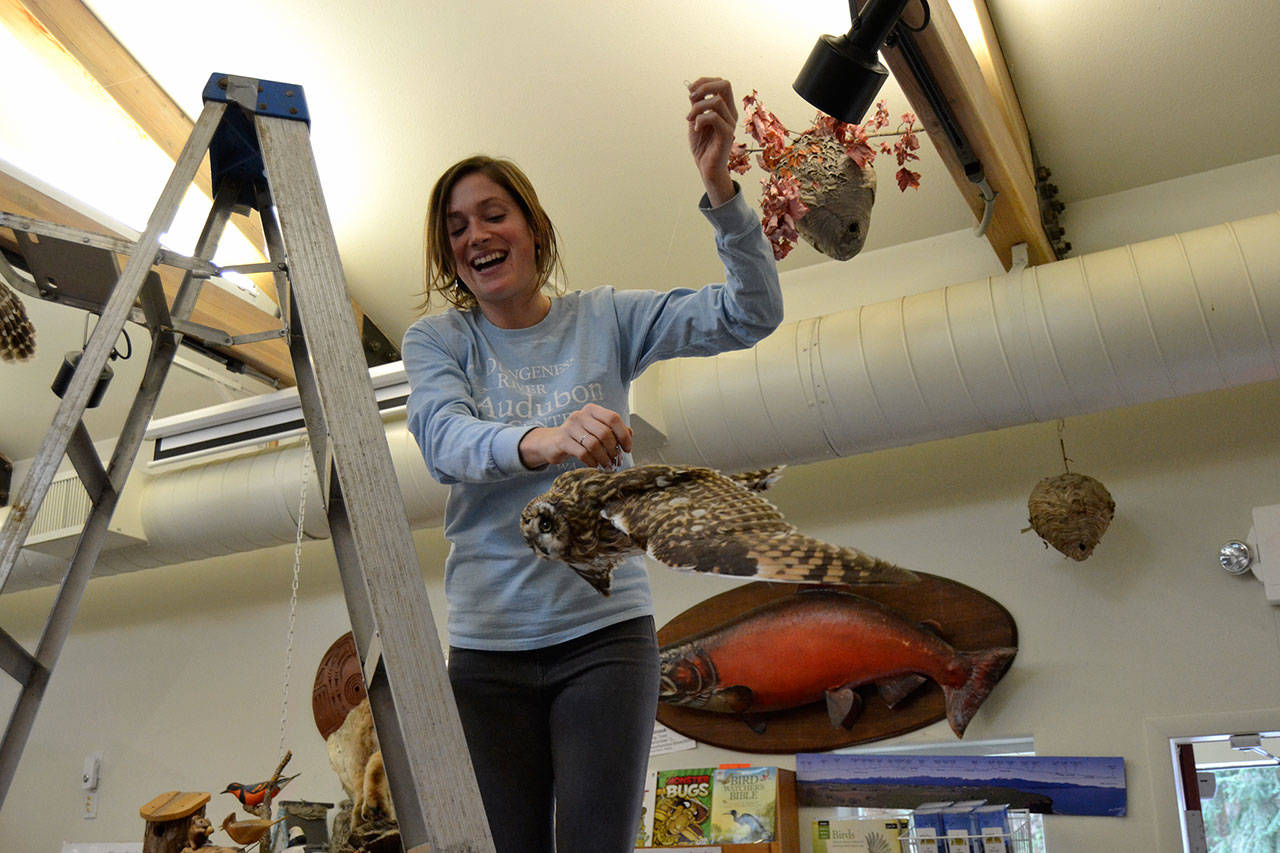Staff and volunteers at the Dungeness River Audubon Center are cleaning house after the discovery of beetles in its taxidermy animal collection.
Powell Jones, the center’s executive director, said that two drugstore beetles were discovered on two birds, triggering a process to remove and freeze each of the 700-plus mounts in the center.
“In here, it could be a huge problem for the collection,” Jones said.
The center has been closed since Jan. 24, but staff said it will tentatively reopen on Feb. 5, with classes resuming that day and exhibits going back into the center that week.
Center board member Darcy McNamara and Terri Tyler, both of Sequim, discovered one of the beetles crawling along the table while they drew a picture of the center’s Pygmy owl.
“Oh, that’s not good,” McNamara said, and met with volunteer instructor Bob Boekelheide, who looked at the beetle under a microscope.
After a staff meeting, center representatives met with an entomologist and reached out to staffers with the Burke Museum in Seattle.
“I like to think of it as ‘art saves science’,” McNamara said. “It’s nice when the two worlds get to collide.”
Jones said staffers at the Burke Museum told him the beetles could ruin the collection, and that drugstore beetles can be pesticide-resistant and chemicals may not reach the beetles.
“The only way to be sure the beetles aren’t in the collection is to freeze the exhibits for 48 hours at 18 degrees (Fahrenheit) or less,” Jones said.
Center staff plan to freeze the exhibits in two sessions for 48 hours, starting Thursday, Jan. 24, and Monday, Jan. 28.
Jones said those with wildlife identification questions, general inquiries and/or to make a donation, contact the center at 360-681-4076 or rivercenter@olympus.net.
Bird pack
Packing up the center’s collection began on Jan. 23, with everything going either into plastic bags and/or tubs wrapped in plastic to keep moisture out. That includes a bear, cougar, penguin and many other birds.
“Part of the issue is nothing can touch. It’s like packing China,” Jones said.
“The geese with wings open is not going to be easy.”
Birds — specifically, falcons, hawks and owls — found with the beetles were sent last week to the Olympic Game Farm, Jones said, where staff there stored the birds in a walk-in freezer at no charge.
For the remainder of the collection, staff rented a freezer truck to cut down on transportation time and any possibility of damaging an animal.
As of Monday, Jan. 28, most of the animals had been frozen over the weekend and placed in storage to thaw. The remainder of items to freeze included books and other miscellaneous items.
The center and the Jamestown S’Klallam Tribe plan to split the costs of an estimated $3,000-$3,500 for the truck and any expenditures, Jones said.
This is the first time the center has experienced anything like this before, he said.
“It’ll be great for the exhibits to be set to zero,” Jones said. “When we come out of this, we’ll have developed a process for donated pieces to be frozen for 48 hours before coming into the building.”
Center staff plan to purchase a freezer in the near future.
While the exhibits are freezing, staff and volunteers plan to clean the facility and do some remediation, Jones said.
“As much as it is a stressor, it’s an opportunity to reset,” he said.
Jenna Ziogas, education coordinator for the center, said about 15 volunteers helped pack and load exhibits and donated for any costs in the past week.
“It’s unfortunate for this to happen but the community came together to help,” she said.
For more information on the Dungeness River Audubon Center, 2151 W. Hendrickson Road, visit dungenessrivercenter.org.
Reach Matthew Nash at mnash@sequimgazette.com.



